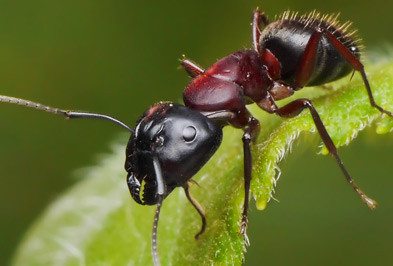Economical Ant Control Solutions: Maintain Your Area Ant-Free
Ecological Effect of Pest Control: Harmonizing Performance With Sustainability
The environmental effect of parasite control is an essential issue that needs a fragile balance between accomplishing performance in ensuring and managing insects sustainability of our ecological communities. From the usage of damaging chemicals that leak right into our dirt and water to the unplanned consequences on non-target species, the consequences of standard bug control techniques are significant.
Damaging Chemicals in Bug Control
The application of harmful chemicals in pest control poses substantial environmental and health and wellness dangers that warrant cautious consideration and mitigation methods. Pesticides, herbicides, and chemicals are commonly utilized to eliminate insects, but their extensive application can result in unintended consequences. These chemicals can pollute soil, water sources, and the air, affecting not just the targeted insects however additionally valuable insects, wild animals, and human beings.

To address these risks, integrated parasite management (IPM) techniques are being advertised as an extra lasting option. IPM includes a mix of techniques such as biological control, environment adjustment, and the targeted use chemicals as a last resource (ant control salisbury nc). By taking on an all natural technique to pest control, we can decrease the ecological and health influences connected with dangerous chemicals while successfully managing pest populaces
Effect on Non-Target Species
Taking into consideration the unexpected consequences of bug control techniques, the effect on non-target varieties is an important aspect that calls for detailed evaluation. While pest control procedures intend to target certain pests, various other organisms in the ecosystem might be inadvertently impacted. Non-target varieties, consisting of beneficial insects, birds, mammals, and also plants, can endure direct or indirect harm from chemical applications or biological control approaches.
Pesticides can have sub-lethal or dangerous effects on non-target species. Pesticides developed to battle a particular insect bug might damage pollinators like bees or all-natural killers such as ladybugs. Additionally, chemical residues can collect in the setting, affecting non-target organisms over time. Organic control agents, if not species-specific, can position dangers to unplanned targets, interfering with the ecological equilibrium.
To reduce the effect on non-target species, integrated insect management (IPM) strategies that emphasize an alternative method to pest control are suggested. These methods focus on making use of eco pleasant methods, lessening damage to beneficial microorganisms while properly handling pest populations. Performing thorough risk assessments and monitoring the end results of parasite control initiatives are necessary actions in protecting non-target species and advertising general ecosystem wellness.
Soil and Water Contamination
Unexpected environmental consequences of parasite control techniques prolong beyond impacting non-target varieties, with substantial ramifications for dirt and water contamination. Chemicals, herbicides, and chemical fertilizers made use of in insect control can seep into the soil and infect groundwater, posturing a danger to both terrestrial and water environments. Soil contamination can interfere with the equilibrium of bacteria important for nutrition biking and plant growth, causing lowered dirt fertility and productivity. Furthermore, these chemicals can continue the environment for extended durations, accumulating in the soil and potentially going into the food chain.
Water contamination is another important problem linked with parasite control methods. To alleviate soil and water contamination from parasite control tasks, incorporated parasite monitoring techniques that prioritize sustainability and reduce chemical inputs are vital.
Air Air Pollution From Pesticide Usage
Exposure to airborne chemicals throughout agricultural applications postures a considerable concern for air pollution control actions. Furthermore, chemical drift, where pesticides are carried by the wind to unintended locations, can lead to the contamination of nearby environments and water bodies.

Approaches for Sustainable Bug Control
In the world of agricultural methods, applying lasting pest control techniques is vital for keeping environmental equilibrium and guarding plant returns. Lasting parasite control stresses making use of eco-friendly techniques to handle bug populaces successfully while decreasing injury to non-target microorganisms and environments. Integrated Bug Administration (IPM) is a commonly embraced technique that integrates organic, social, physical, and chemical control techniques to accomplish long-lasting insect management solutions.
One key method in sustainable insect control is promoting biodiversity within agroecosystems. By enhancing all-natural opponents of insects, such as predators and parasitoids, farmers can lower the requirement for synthetic pesticides. Plant rotation and diversification are likewise efficient methods to disrupt pest life process and develop less favorable problems for insects to flourish. In addition, utilizing pest-resistant crop selections and utilizing techniques like catch cropping can aid minimize insect stress without depending heavily on chemical treatments. Eventually, by incorporating these sustainable pest control approaches, farmers can accomplish an equilibrium in between pest administration performance and ecological stewardship.
Final Thought
In verdict, the environmental effect of pest control techniques have to be meticulously considered to stabilize effectiveness with sustainability. Hazardous chemicals made use of in pest control can cause dirt and water contamination, air contamination, and damage non-target species - termite control. It is important to carry out lasting insect control methods to decrease these negative effects on the atmosphere and advertise a much healthier ecosystem for future generations
By adopting a holistic technique to pest control, we can decrease the ecological and wellness influences associated with hazardous chemicals while efficiently handling pest populations.

To reduce the air contamination triggered by chemical use, it is crucial to embrace integrated parasite management approaches that focus on the use of non-chemical bug control methods, such as plant turning, all-natural predators, and immune plant Resources varieties. Lasting parasite control emphasizes the use of eco pleasant methods to handle parasite populations successfully while minimizing harm to non-target microorganisms and ecosystems. Integrated Bug Management (IPM) is a commonly taken on strategy that combines biological, cultural, physical, and chemical control approaches to attain long-term insect monitoring solutions.